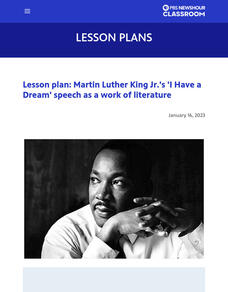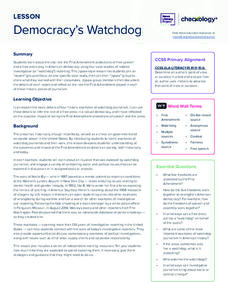College Writing Center
Reported Speech & Direct Speech
Provide your class with this reference page on direct and indirect speech. The page includes definitions of direct speech and reported speech (also known as indirect speech). When writing, pupils can check the sample sentences provided...
Pimsleur
Book Report
Discover Italian families though a book study. Learners also practice Italian vocabulary and grammar, explore direct and reported speech, and complete an assessment or final project.
PBS
Dr. Martin Luther King Jr.’s ‘I Have a Dream’ Speech as a Work of Literature
To appreciate the oratory of Dr. Martin Luther King Jr.'s "I Have a Dream" speech, scholars examine the rhetorical devices and influences that make the speech so famous. They examine background information, conduct a close reading of the...
EngageNY
Final Performance Task: Delivering an Opinion Speech with Multimedia Display
Welcome to the grand finale! Scholars practice reading their speeches to a partner and make last-minute changes based on feedback. Pupils then present their final opinion speeches to their small groups and show off their work in a...
Albert Shanker Institute
Heart of the Matter
Most people have heard of Dr. Martin Luther King, Jr. and his famous "I Have a Dream" speech, but few have heard of Philip Randolph and Bayard Rustin. Who were these guys and what did they have to do with this famous landmark event in...
Franklin D. Roosevelt Presidential Library & Museum
Pearl Harbor Activity #1: Newspaper or Radio Account
After listening to President Franklin D. Roosevelt's "Day of Infamy" speech, young historians research information about the Japanese attack on Pearl Harbor, possible motives for the attack, and the consequences of the attack. Scholars...
News Literacy Project
Democracy’s Watchdog
As part of a study of the importance of the First Amendment, expert groups research different historic case studies of investigative reporting, and then the experts share their findings with jigsaw groups. The case studies include Nellie...
Academy of American Poets
Teach This Poem: “In This Place (An American Lyric)” by Amanda Gorman
Amanda Gorman, the United States's first National Youth Poet Laureate, is featured in a resource from the Academy of American Poets. Class members first read Dr. Martin Luther King, Jr.'s "I Have A Dream" speech and note what King wanted...
Facing History and Ourselves
The Importance of a Free Press
"Congress shall make no law . . . abridging the freedom of speech, or of the press;. . ." Why is this guarantee of free speech and a free press the First Amendment to the US Constitution? Why are these rights so essential to a democracy?...
Nemours KidsHealth
Bullying: Grades 9-12
Scholars learn to shut down the rumor mill by asking three questions: "Is it kind?" "Is it true?" "Is it necessary?" in an 11-page packet that details three activities designed to make a difference at your school. Here, pupils run for...
Nemours KidsHealth
STDs: Grades 9-12
After gathering information about Sexually Transmitted Diseases (STDs), high schoolers engage in two activities designed to educate themselves and others. They begin by using what they have learned to write a speech for a friend who...
Advocates for Human Rights
Nativism and Myths about Immigrants
Where do anti-immigrants myths come from, and how can they be refuted? Learners critically analyze media reports and how to identify reliable sources. After studying a timeline that details the history of US nativism, groups research the...
Newseum
Introduction to the First Amendment: What’s a Violation?
Young historians take an in-depth look at the five freedoms granted by the First Amendment. Groups apply their knowledge of the freedoms to a series of scenarios to decide if the depicted actions represent a violation of the amendment.
EngageNY
Editing Sentences and Creating Visual and Multimedia Displays for a Presentation
Let's get visual. Pupils plan visual displays to accompany their upcoming opinion speech presentations. Additionally, they practice editing sentences for clarity before revising their speech drafts.
Stanford University
Lesson Plan: Montgomery Bus Boycott
Most of us have heard of Rosa Parks, the Montgomery Bus Boycott, and Martin Luther King, Jr. But what about Claudette Colvin, Virginia Durr, Freedom Summer, or the Birmingham Children's Crusade? A five-lesson unit prompts class members...
National Endowment for the Humanities
Lesson 2: The United States, France, and the Problem of Neutrality, 1796–1801
While the French Revolution could be considered inspired by the American Revolution, it created thorny problems for the new United States. Should the United States get involved and be drawn into a European drama? Was the US strong...
ReadWriteThink
Living the Dream: 100 Acts of Kindness
Inspire kindness in and out of school with a lesson that challenges scholars to perform 100 acts of kindness during the time between Martin Luther King Jr. Day to Valentine's day. Leading up to a celebration of friendship, learners...
British Council
Unit 6: Enquiries
So many questions! How do people in the business world answer them? Young communicators demonstrate their understanding of correct grammar in the sixth of nine lessons focused on developing career skills. Types of questions range from...
EngageNY
Resource Materials and Gathering Information: Reading Another “Choice” Text from the Research Folder
Look it up. Scholars use a dictionary and thesaurus to verify the meaning of the research vocabulary words they defined in the previous activity. They then use sticky notes to write a synonym for each word. Finally, individuals choose a...
Stanford University
Martin Luther King, Jr. and Malcolm X: A Common Solution?
Much has been made of the differences between Martin Luther King, Jr. and Malcolm X. But was there any common ground between them? Class members reconsider what they think they know about these two civil rights leaders with biographical...
Council for Economic Education
Economic Data Lesson: Economic Policy Options
Can you make decisions that will impact millions of people around the nation? Scholars research the role of the Federal Reserve, and its Chairman, on the economic outlook of the country. They analyze current trends in unemployment,...
Savvas Learning
Clauses
Noun, adverbial, and adjective clauses are the focus of this 26-page grammar packet designed for language learners. Loaded with activities, exercises, games, and worksheets, the materials can be adapted for most levels.
Channel Islands Film
Arlington Springs Man: Lesson Plan 1
Learning to craft quality questions is a skill that can be taught. Class members use the Question Formulation Technique to learn how to create and refine both closed-ended and open-ended questions. They then view West of the West's...
National Endowment for the Humanities
Kate Chopin's The Awakening: Local Color in the Late 19th Century
Kate Chopin's The Awakening introduces readers not only to the lush Louisiana setting of Grand isle but also to the nuances of Creole culture. the second lesson in a three-part series examines how Chopin's use of literary realism and...
Other popular searches
- Direct Reported Speech
- Esl Reported Speech
- Reported Speech Questions
- Grammar Reported Speech
- Direct and Reported Speech
- Reported Speech Commands
- Esl Lessons Reported Speech
- Reported Speech Lesson Plan
- Reported Speech Comic Strip

























